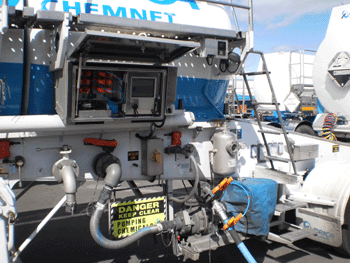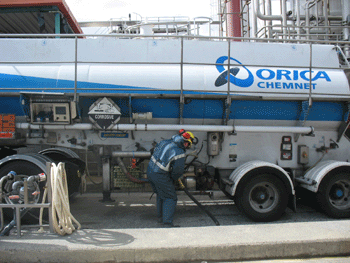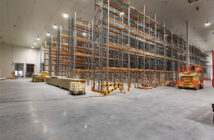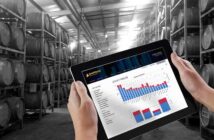Industry uses millions of litres of chemicals every day. Many are incompatible and accidental mixing can have serious consequences.
Bulk liquid road tankers are commonly used to transport multiple combinations of chemicals and during this delivery phase mixing mistakes can happen. There is greater potential for human error.
Chemicals company Orica Chemicals (NZ) recognised that, even with rigorous driver training and delivery processes, statistically there was a one-in-22,000 risk of a serious incident occurring.
Health and safety issues are a number one priority for the company and eliminating human error is a big focus.
In 2009 Orica began to explore the possibility of an engineering solution to ensure correct deliveries.
“An engineering solution simply didn’t exist anywhere in the world,” says Paul Develter, Orica’s business manager, trading.
“We had to start from scratch to design, develop and implement the technology ourselves, right here in New Zealand.”
After nearly three years, $3.1 million and more than 18,000 engineering hours, the CoDe (Correct Delivery) system was born.
It made its maiden journey in January this year and quickly proved its worth with customers.
Fonterra recently recognised Orica’s commitment to this health and safety initiative by awarding the company its Supreme Vendor of the Year award.
“Health and Safety is of fundamental importance to us at Fonterra. It’s great to see Orica also on this journey with us, and we are pleased to recognise its effort and hard work with this award,” says Joe Coote, director of the group supply chain.
CoDe is based on wireless RFID (radio frequency identification) technology. The computerised CoDe system is installed on 41 chemical tanker trailers, and RFID tags are attached to 842 delivery points throughout New Zealand.
RFID technology tracks the contents of an Orica tanker from when it’s loaded to the customer’s delivery point. CoDe prevents tankers from unloading at the incorrect delivery point by keeping the tanker’s compartments locked and the trailer’s pump disabled until the correct connection is made and verified.
RFID tags are fitted to each supply and each delivery point. The tags – encased in a chemically resistant, robust package to cope with harsh industrial environments – are passive and don’t require external power.
CoDe computers fitted to the trailer both monitor and control the compartment contents, valve locks and pump.
They include full event logging and, importantly, are designed to manage multiple chemical combinations in the one load.
Due to the variety of delivery methods used, the computers can be tailored to meet specific needs including interfacing to existing logistics systems, daily event reporting, and the ability to add additional instruments such as level detection, flow or pump activity.
The safety implications of CoDe for Orica’s customers are substantial: implementation of this system has vastly reduced the risk associated with delivering hazardous chemicals.
“The health and safety of Orica’s staff, customers and plant is paramount,” says Mr Develter.
“Our industry is inherently risky and we take our role in minimising the dangers for all involved very seriously.”
CoDe is used in the mining, water, food and beverage, chemical, bulk liquids and transport industries in New Zealand. Orica is presently exploring applications for CoDe in Australia.






























































































